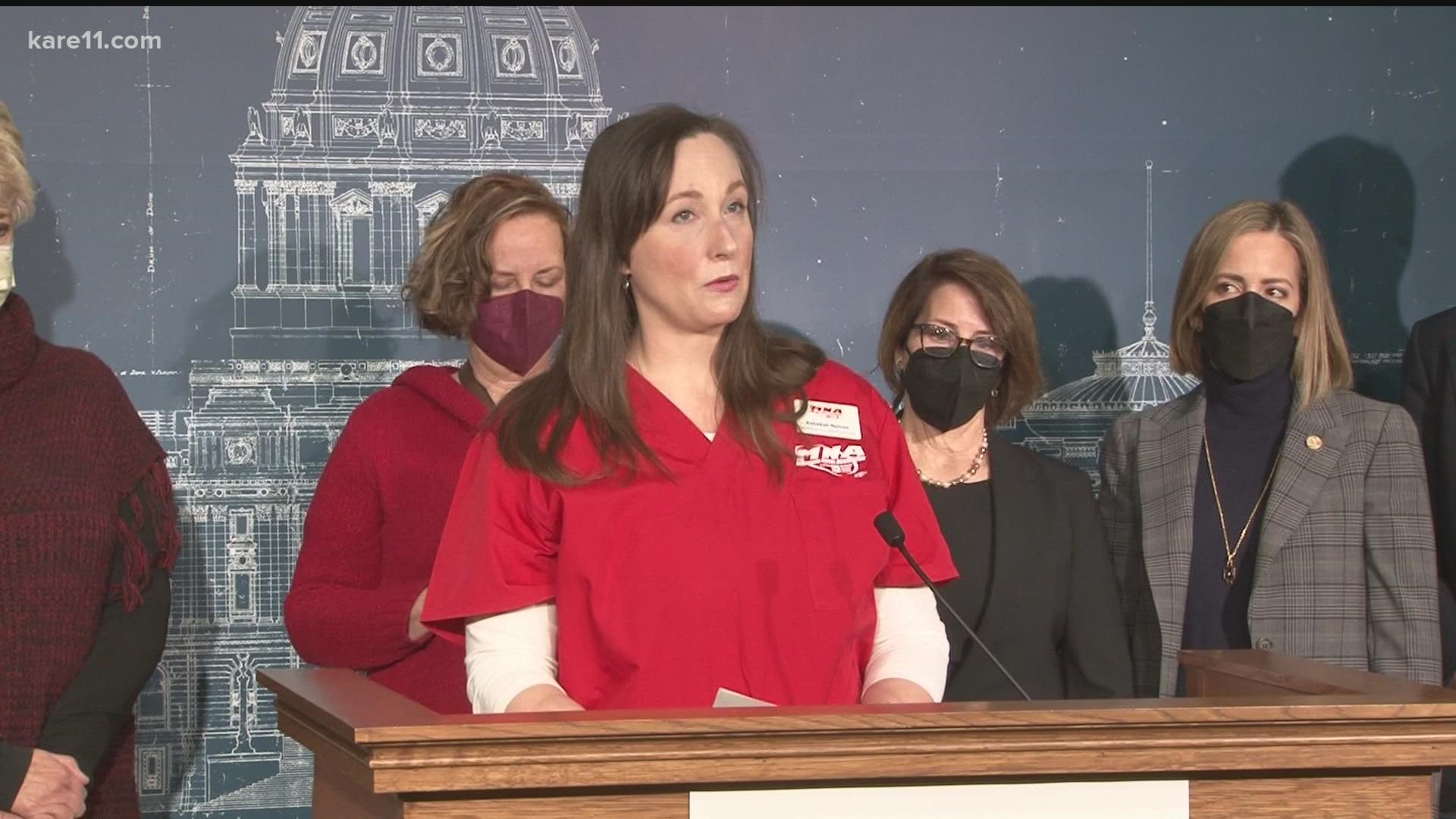ST PAUL, Minn. — DFL lawmakers have proposed what they consider a long-term solution to the hospital nurse shortage that has been years in the making but brought into sharper focus by the strains of the COVID-19 pandemic.
Bills authored by Sen. Erin Murphy of St. Paul and Rep. Liz Olson of Duluth are aimed at setting limits on the number of patients a nurse can be assigned to care for at the same time, in hopes of preventing burnout that has led some nurses to leave hospitals for other medical settings or exit the profession altogether.
Rather than a one-size-fits-all, statewide nurse-to-patient ratio, the "Keeping Nurses at the Bedside" bill would mandate each hospital set its own maximums, developed by a committee made up of equal numbers of managers and direct care nurses.
"It is a hyper-localized, hospital-by-hospital approach where nurses are with hospital administration setting an annual plan to assure nurses have a say in the number of nurses that are practicing based on the census of the hospital," Sen. Murphy told reporters.
"This process will make sure the nurses are there saying, 'In our professional judgement, this is what it’s going to take.' And there will be a process in place to hold them to that."
She said if there are questions about compliance with the staffing agreements set by the hospital committees, the Minnesota Dept. of Health would be tasked with investigating those cases and enforcing civil penalties.
The legislation, if passed, would also set up a student loan forgiveness program to help recruit new people into the nursing field. It would also establish a grant program to help hospitals pay for mental health treatment for nurses struggling with the stress.
National Guard members and federal Dept. of Defense medical teams have been deployed to fill gaps at hospitals and long-term care facilities during the pandemic. The state has also hired hundreds of contract nurses to help hospitals make it through the worst of the Omicron variant surge.
Staffing and safety issues have been a focal point of labor disputes in the past decade between hospitals and union nurses who are part of the Minnesota Nurses Association. The MNA helped write the legislation, and several union members appeared at a State Capitol press conference with Murphy and Olson.
"It’s not just us here whining because we want to whine about it," MNA President Mary Turner, who is also a COVID ICU nurse at North Memorial Hospital, remarked.
"We are here because we are honest-to-God seeing that our patients are suffering and it is intolerable."
The Minnesota Hospital Association remains opposed to any staffing formulas or ratio. The MHA response to the bill read issued, in part, as follows:
"We were disappointed by the tone of today’s event given how hard management and labor have been working collaboratively to address the COVID-19 pandemic care needs of so many Minnesotans. We share, and have been working with lawmakers on, many of the concerns raised today --- particularly in asking the state to invest new financial resources into sustaining and developing Minnesota’s health care workforce."
"Patient needs are constantly changing, and COVID-19 has reinforced that flexibility is needed at the bedside. Staffing and caring for patients is about more than the number of RNs, but rather the entire care team - each of whom brings a unique skill set in serving patients-- team members like nurses’ aides, respiratory therapists, physical therapists, pharmacists, and physicians."
The hospital group said it does agree with the union that the state should issue extra pay for frontline workers. The bonus pay bill passed last year left it up to a bipartisan committee to decide which workers should get checks, but the panel is politically divided on that question.
The MHA also supports the loan forgiveness element of the bill but would want it to be available to a wider variety of healthcare professionals.
Turner and other nurses who spoke said being understaffed takes an emotional toll on nurses because they know they can't provide the quality of care they've been trained to give.
"There’s no worse feeling than going home knowing that people under your care didn’t get what the needed, because you couldn’t be in three places at once," said Daniel Clute, a union nurse who worked at the Bethesda COVID hospital until it closed and was then transferred to St. Joseph.
Becky Nelson, a union leader who works as a nurse in the Abbott-Northwestern system, said her decision to keep working through the pandemic has been hard on her physically and mentally.
"I have experienced increasing depression that has required additional medication, and have had stress-related hair loss," Nelson explained.
"We want to provide outstanding care to our patients but we’re being pressed to do more and more with less and less."
Watch more local news:
Watch the latest local news from the Twin Cities in our YouTube playlist:

